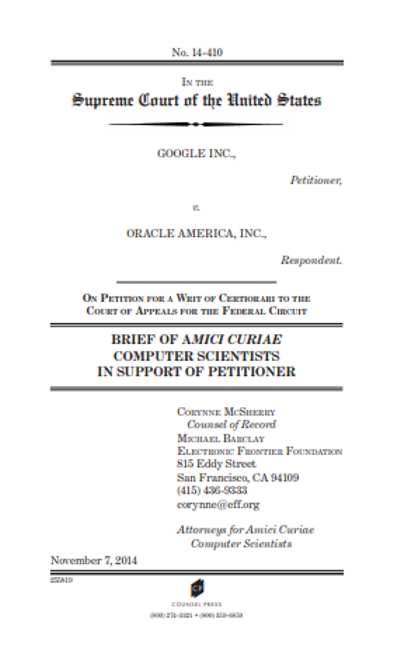| Computer Scientists Petition Supreme Court Over API Copyright |
| Written by Sue Gee | |||
| Wednesday, 12 November 2014 | |||
|
The Electronic Frontier Foundation has filed a brief on behalf of 77 computer scientists urging the US Supreme Court of the United States to overturn a finding that APIs are copyrightable.
The request is to review the decision handed down by the U.S. Court of Appeals for the Federal Circuit in May in the Oracle versus Google lawsuit, see Oracle Wins Copyright Appeal. It comes in the form of an amicus brief in support of a recent petition by Google to reverse the ruling that Oracle's Java API's were protected by copyright. This is the second amicus brief that the Electronic Frontier Foundation (EFF) has drawn up in support of Google. The previous one, see Are APIs Copyrightable? Computer Scientists Urge Court To Say No, petitioned the US federal court to uphold Judge Alsup's finding that Oracle's Java APIs were not copyrightable.
The additional argument in this new brief, which is an 84-page pdf, is that the Federal Cicuit's decision, "has disrupted decades of settled expectations that APIs are not copyrightable" The brief states: The Federal Circuit's decision poses a significant threat to the technology sector and to the public. If it is allowed to stand, Oracle and others will have an unprecedented and dangerous power over the future of innovation. API creators would have veto rights over any developer who wants to create a compatible program - regardless of whether she copies any literal code from the original API implementation. That, in turn, would upset the settled business practices that have enabled the American computer industry to flourish, and choke off many of the system's benefits to consumers. It then restates the three main points made previously, starting with Uncopyrightable interfaces were essential to the development of modern computers and the Internet This is backed up with diverse examples: the spread of affordable PCs was made possible because IBM held no copyright on its BIOS system, allowing competitors to build PC clones; the open nature of APIs was also essential to the development of the Unix OS, the C programming language, the open protocols on the Internet and cloud computing. The second point makes the case that interfaces being uncopyrightable gives developers the freedom to create novel software and that copyrighting APIs would not only block innovation but would make different systems incompatible.The final argument is that copyright in interfaces would create an "orphan software problem" which would disproportionately affect the public sector. While the previous amicus brief had 33 signatories, there are now 77, including five Turing Award winners, four National Medal of Technology winners, and numerous fellows of the Association for Computing Machinery, IEEE, and the American Academy of Arts and Sciences. The list includes designers of computer systems and programming languages such as AppleScript, AWK, C++, Haskell, IBM S/360, Java, JavaScript, Lotus 1-2-3, MS-DOS, Python, Scala, SmallTalk, TCP/IP, Unix, and Wiki. Names and details are given in an alphabetical list of the Amici Curiae which occupies the final 47 pages of the document. It is a prestigious collection and it is to be hoped that the US Supreme Court is impressed.
More InformationComputer Scientists Ask Supreme Court to Rule APIs Can’t Be Copyrighted Related ArticlesAre APIs Copyrightable? Computer Scientists Urge Court To Say No Android Copyright Battle Goes To Supreme Court Judge Rules Oracle's Java APIs Not Copyrightable
To be informed about new articles on I Programmer, install the I Programmer Toolbar, subscribe to the RSS feed, follow us on, Twitter, Facebook, Google+ or Linkedin, or sign up for our weekly newsletter.
Comments
or email your comment to: comments@i-programmer.info |
|||
| Last Updated ( Saturday, 16 November 2019 ) |




